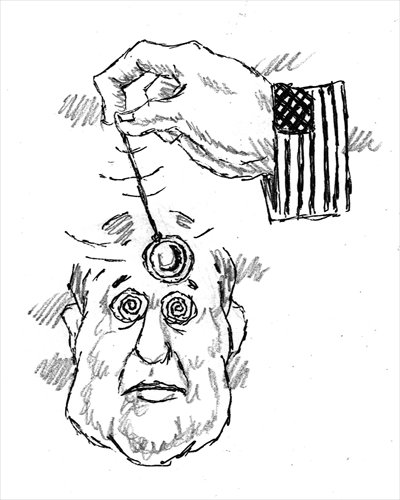China through the eyes of Western media

Illustration: Peter C. Espina/GT
Chinese people frequently complain that their country is misrepresented by the Western media. This was the view of an ex-student of mine who, while studying in the UK, decided to protest outside the BBC studios in Manchester about what he perceived as persistent demonization of his homeland. So he stood on the steps of Britain's premier broadcaster, wearing a t-shirt which proclaimed to the world "I love China," while crowds of confused locals stared.
While some might see this young man's act of patriotism as earnest but ultimately futile, it seems to me that he had a point. The Western media, constantly on the search for attention-grabbing stories, tends to only publish stories that conform to the idea that everything Chinese is somehow strange, bad or revolting.
In an effort to assess whether China is really being demonized by the Western media, I took note of the news stories about China which were most prominent on English-language internet news outlets in a five-day period, between August 19 to August 23.
Obviously these news stories constitute only a small sample, covering only a brief period of time. Nevertheless, I think they provide an accurate snapshot of the preoccupations of Western media with regard to China. They also enable one to draw some conclusions about how Westerners perceive China through the media.
On August 19 USA Today reported that a blast in a coal mine in Anhui Province had trapped 27 miners underground. Other publications later announced that at least two of the miners had died.
On August 20 Western media announced that Chinese hackers had stolen information from the investigation into the disappearance of Malaysian Airlines flight MH370.
On August 21 the UK's Daily Mail reported that a Chinese family had put their baby in a salad bowl and covered him with lettuce leaves. Photos of the incident were published in the newspaper.
On August 22 media outlets proclaimed that a Chinese fighter plane had flown near a US fighter plane which was patrolling the skies east of Hainan. According to US officials, the Chinese pilot performed a barrel roll, and the maneuver was "very close and very dangerous." An interpretation of events from the Chinese perspective was not included in any of the reports.
On August 23 it was widely reported that a chef in Guangdong had been killed by a cobra he was cooking. The cobra bit him after he had cut its head off. Hearing screams from the kitchen, diners decided to stop eating and leave the restaurant.
The above stories give an idea of Western media representations of China, which here divide into two main categories: the bad and the bizarre. The bad in this case consists of poor safety in coal mines, computer hacking and military threats, while the bizarre refers to food and child rearing customs.
I am not arguing that the events described above did not happen, or that they should not be reported. But I am arguing that Western audiences who are fed mainly stories like these are likely to form a prevailing image of China as an unsafe, computer hacking, baby-torturing, snake-eating, militarily aggressive State.
Such an image, it goes without saying, lacks balance and does not provide a complete picture of modern China.
This article was published on the Global Times Metropolitan section Two Cents page, a space for reader submissions, including opinion, humor and satire. The ideas expressed are those of the author alone, and do not represent the position of the Global Times.